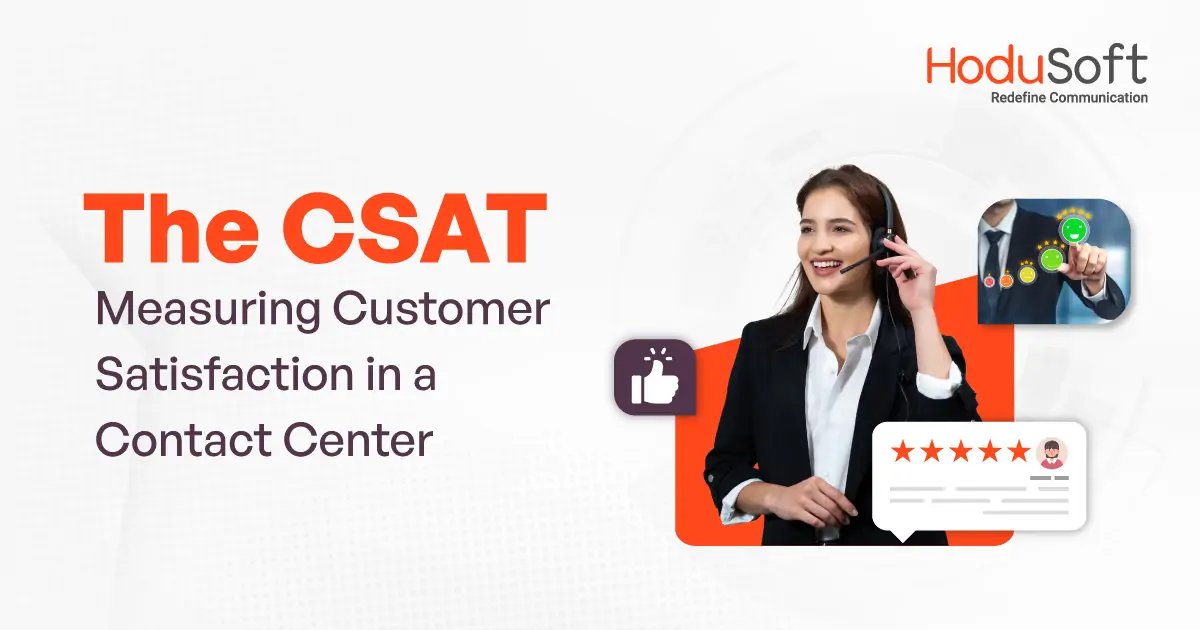The CSAT: Measuring Customer Satisfaction in a Contact Center
For every complaint a contact center receives, there are around 26 clients who are dissatisfied with the service but prefer not to express their displeasure. That’s a statistic worth taking note of, that there are many who choose to remain silent and though you think you may be doing extremely well, you may actually not be! These are the clients you will almost certainly lose if you do not take appropriate action.
Low customer satisfaction levels can hurt your brand’s image in addition to losing customers and cash, especially if certain customer complaints become viral online. And this could apply just as well to contact centers, where customers actually interact with brand representatives, your agents.
Fortunately, customer satisfaction assessment tools may assist you in collecting crucial client feedback, allowing you to implement the changes and improvements that your customer base has requested – to provide them with a better experience and a more enjoyable customer journey. We can call these customer satisfaction measures as customer experience (CX) metrics. In this blog, we will be looking at one particular CX metric, the CSAT (customer satisfaction).
Everyone’s familiar with the ‘dial 1 to leave feedback’ and ‘dial 2 to proceed without feedback’ prompt before a conversation is initiated with a contact center. There would also be a few options provided to pick from to rate the service provided by the agent. This is one example of a CSAT in a contact center.
What is customer satisfaction (CSAT)?
Customer satisfaction is a term frequently used in marketing. It is a measure of how products and services supplied by a company meet or surpass customer expectations. Source:- Wikipedia
There appears to be no commonly agreed definition of consumer satisfaction. However, the majority of them agree that customer satisfaction is inextricably linked to expectations, hence the continuous dispute over whether it is a cognitive or emotional activity.
There are numerous interesting ideas used to describe consumer satisfaction, but the two most often accepted are the disconfirmation and value-percept theories.
The first says that customers compare a new experience to a standard they already have in mind, and their pleasure with the product/service is determined by whether it meets their expectations. Although it is a widely established idea, it is difficult to apply to all product categories.
The second is the expectancy-value theory. It postulates that customer views about a product’s value and advantages are driven by personal needs and desires. Customer satisfaction levels are determined by how close the initial judgment is to the value provided by the product after the purchase.
To summarize, the gap between the performance of the product with which a customer interacts and his or her own expectations and demands in regard to it is what shapes customer happiness.
How does this apply to the measurement of CSAT for a contact center? The disconfirmation approach typically applies to regular or loyal customers, where they have a perceived view of how good the service is. If the service offered by an agent is below par, then they are bound to be dissatisfied. The expectancy-value theory on the other hand means more for people who are new to the service and have heard about the product somewhere and think it might satisfy their needs.
CSAT for a contact center
A CSAT score in a contact center is one measure of customer satisfaction. CSATs are acquired by contact centers too to gauge the overall customer experience. Given how frequently call centers to engage directly with customers, CSAT surveys are commonly used to assist with measuring their quality of service. The most typical application is for customers to score their happiness with a call after it has ended.
This survey is typically delivered over the phone immediately following the completion of the call through a survey IVR or by email at a later date. Surveying through SMS for a quick, low-friction experience is also possible. IVR surveys from HoduSoft can be a game changer for your business. You can broadcast surveys through WhatsApp and SMS as well.
Another popular application is asking customers to score their happiness once a case or ticket has been resolved. In contrast to the first use case, when the survey is delivered as soon as the call is completed, the CSAT survey is issued after the customer’s issue has been handled.
In this case, the consumer is rating their happiness with how their question was handled from the beginning to the end.
Because of its adaptability, CSAT is an excellent choice for contact centers. Contact center managers can tweak the CSAT survey question in a variety of ways to find areas where callers may be frustrated. For example, broad questions such as “How satisfied are you with the assistance you received?” can be used. Alternatively, to be more specific, how satisfied are you with your wait time throughout your call today.
Advantages of CSATs for a contact center
Versatile
CSAT for contact center software has the advantage of being a versatile customer satisfaction metric. You can easily design questions to conduct a thorough examination of your brand’s strengths and flaws. Because the rating scale may be related to the context, you can utilize various indicators (such as numeric scales, stars, and emoticons) that appeal to your audience.
Read Also: How omnichannel creates seamless customer service experience
Engagement
CSAT surveys for contact centers also allow you to engage with your audience in a variety of ways, from simple to complicated. If you have a larger business (such as a hotel chain) and don’t want to barrage clients with many one-question surveys, the more comprehensive formats can be very useful.
Disadvantages of CSATs and how to overcome them
CSATs, despite having quite a few advantages, could have disadvantages as well. Thankfully there is a way around each one of them. Let us look at some of them.
Temporal and subjective
The first disadvantage of CSAT for a contact center is that it primarily measures short-term customer sentiment, as the results are typically based on how they are feeling on a specific day. The measure of satisfaction could also vary from one person to another, depending on how demanding they are. A way to get around this is to ask straightforward questions and make an effort to understand underlying emotions more clearly.
For instance, instead of posing the question, “What did you think about the service?”, you must ask three separate questions:
- Was the agent able to understand you?
- Was the service timely?
- Are you impressed with the resolution?
Cultural bias
The extent of positivity or negativity for a product could be related to the demographics as well. As an example, consider the issue of cultural bias. According to a Psychological Science article, people from more individualistic countries are more likely to choose the more “extreme” sides(“Very Satisfied,” “Very Dissatisfied”) than people from collectivist countries, where people are more likely to rate themselves in a subtle way”Not Satisfied” or “Satisfied”). One way to overcome bias in this case would be to view the CSATs from different regions distinctly and not to combine them. This will also give you an idea on how to improve a product or service to drive better feedback there.
Incompletion
Clients in the “Neutral” or “Dissatisfied” categories who do not complete the entire survey may also affect your CSAT result. The reason why they do so may be because of admissions anxiety. One way to get around this is to offer incentives to customers to complete the surveys. It could be a simple cashback or a chance to win a big prize in an end-of-the-month draw. Everything counts, when trying to get customers to complete the surveys. There still however would be incomplete surveys, due to connectivity issues, which would have to be ignored.
Fear
There is another kind of anxiety that too can affect a customer. Users who rely on your brand’s customer service on a regular basis may be scared to be honest with the brand, especially if they believe that providing negative feedback would affect the turnaround time or ongoing business relationship. You may remove that anxiety by employing anonymous polls in which respondents can leave their names only if they feel comfortable doing so.
How do you measure CSAT?
Businesses directly ask the relevant consumer base to score their satisfaction with an event, product, or service to measure CSAT for a contact center. This is usually in the form of a survey sent to the customer via some channel (direct mail, email, phone, etc).
The specific phrasing of the CSAT question, as well as the associated grading system utilized in surveys, differs from one organization to the next. As a result, there is no industry-standard method for measuring CSAT. Among the frequently asked questions are:
- Were you pleased with the service ? (Yes/No)
- How pleased are you with __ on a scale of 1-10?
- What is your level of satisfaction with ? (Unsatisfied, Satisfied, Extremely Satisfied, etc.)
It is up to your company to select which answers qualify as “satisfied” and which do not for CSAT questions that do not require a binary answer. You may determine that anything above a ‘6’ rating on a scale of 1-10 qualifies as satisfied.
CSAT scores do not have a single universal assessment. The numerical score will be determined by the question being asked. Having stated that, this generic computation might be used to assess the fraction of satisfied customers.
Other metrics for customer satisfaction
Customer satisfaction can be measured using other techniques as well. The two other metrics for customer satisfaction are:
- NPS (Net promoter score) – Measures how likely a customer is to recommend a particular product or service to somebody else?
- CES (Customer experience score) – Measures how easy or difficult it was to accomplish something.
For a contact center, the CES score is more pertinent than an NPS, though an NPS is a more concrete measure of brand loyalty.
When is the best time to measure CSAT?
CSAT for a contact center should be assessed periodically, whether quarterly, monthly, or after each client interaction. The time frame should be determined by your organization’s aim for gathering consumer feedback. In general, try to request feedback immediately following a contact or transaction, while it is still fresh in the customer’s mind.
When collecting other measures, such as NPS (net promoter score) or CES (Customer experience scores), it is also beneficial to measure CSAT for a contact center. This gives you a more complete picture of your consumers’ overall contentment. These activities contribute to lower customer churn by constantly looking for ways to improve the customer experience.
Closing words
CSATs are a great way to understand how good or bad, how high or low a customer feels or thinks about a product or service. In the context of a contact center, they can be modified to pinpoint exactly why the customer is sad or happy as well, to obtain clearer feedback. Talk to HoduSoft today to have your surveys setup, integrate with your CRM to gain a better understanding of the customer, and so much more in your contact center.



